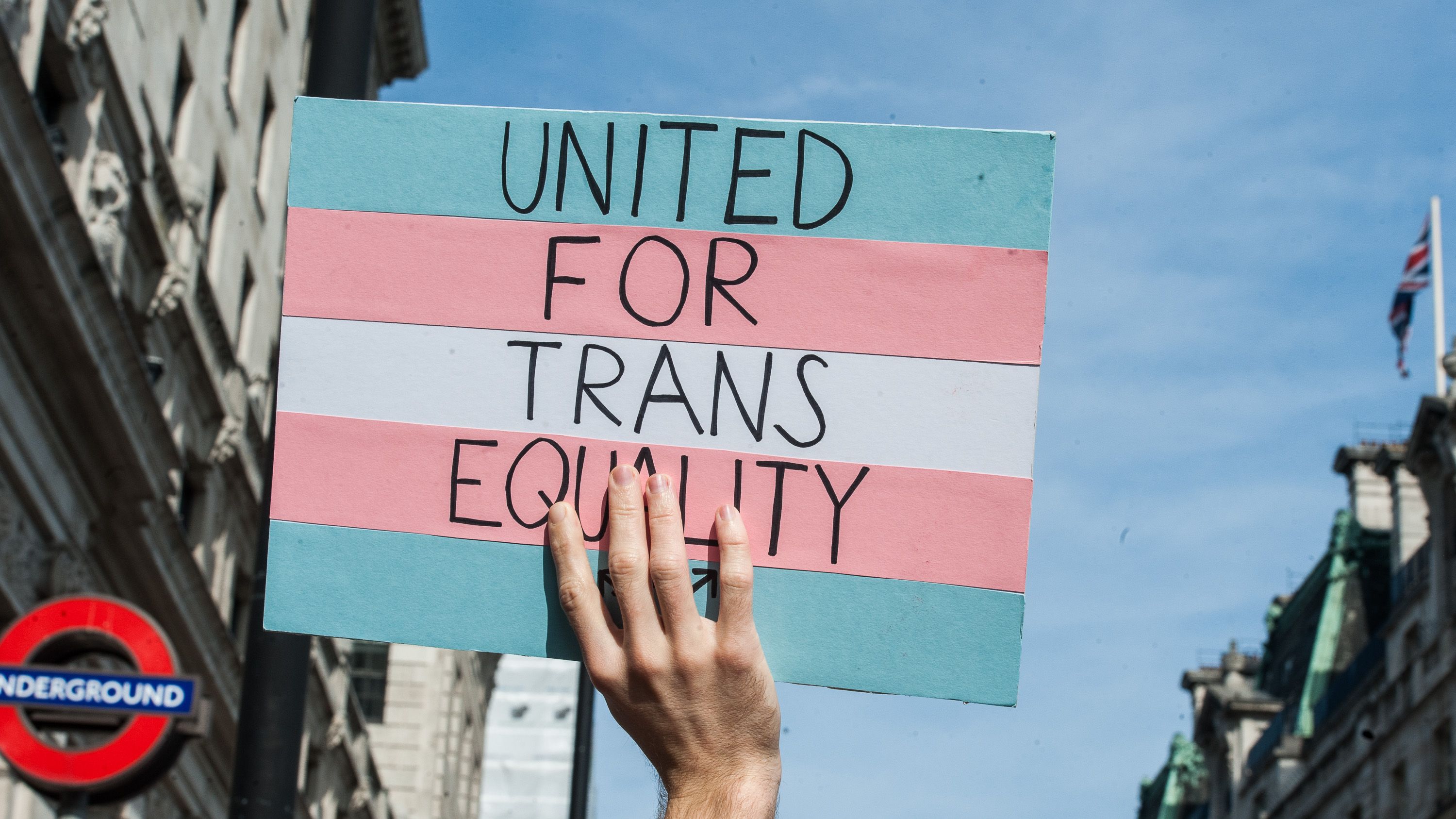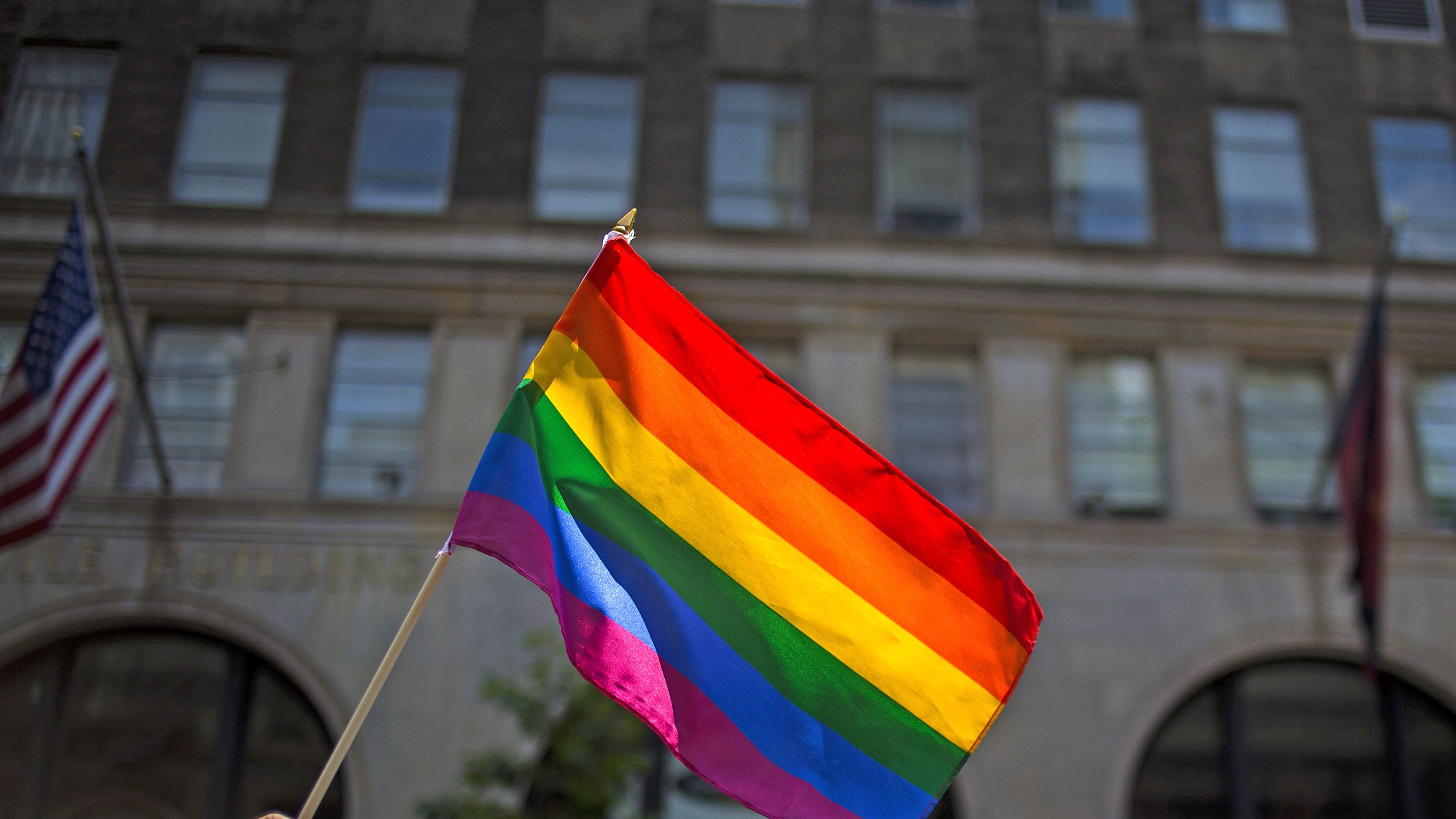Anti-Trans Legislation Is in the Works Across the Country
The anti-trans movement continues to manifest at an alarming rate at the state level.


When President Biden signed an executive order on his first day in office stating that all people should "receive equal treatment under the law, no matter their gender identity or sexual orientation," it sent a strong message that the new administration would protect the LGBTQ+ community under the country's current anti-discrimination laws, including the Civil Rights Act of 1964 and the 2020 Bostock v. Clayton County Supreme Court decision.
The executive order reads:
"Every person should be treated with respect and dignity and should be able to live without fear, no matter who they are or whom they love. Children should be able to learn without worrying about whether they will be denied access to the restroom, the locker room, or school sports. Adults should be able to earn a living and pursue a vocation knowing that they will not be fired, demoted, or mistreated because of whom they go home to or because how they dress does not conform to sex-based stereotypes. People should be able to access healthcare and secure a roof over their heads without being subjected to sex discrimination."
The executive order also acknowledges the unique discrimination Black transgender people face:
"Discrimination on the basis of gender identity or sexual orientation manifests differently for different individuals, and it often overlaps with other forms of prohibited discrimination, including discrimination on the basis of race or disability. For example, transgender Black Americans face unconscionably high levels of workplace discrimination, homelessness, and violence, including fatal violence."
While this executive order, along with the repeal of the transgender military ban, is an important step at the federal level, anti-trans sentiment is continuing to manifest at an alarming rate at the state level, with a record number of anti-trans bills—at least 35 and counting—in the works across the country. These bills are attempting to ban trans people from participating in sports and eliminate their health care access; ultimately, they threaten to take away trans people's basic human rights. Chase Strangio, deputy director for transgender justice with the ACLU’s LGBT & HIV Project, has been lobbying against anti-trans bills for the past six years, and tells Marie Claire that this most recent legislative session includes "the most terrifying permutations of bills and risks of passage" he has encountered. And the reasons why such bills have been introduced recently are clear.
"It's the perfect storm of backlash to the Supreme Court's decision in Bostock. When you have a big Supreme Court win, you know that you're going to get backlash in the states attempting to chip away at that. It's partly a response to the Biden administration and the shift in power at the federal level as well," explains Strangio. He continues: "I also think it's just the function of the rise in anti-trans sentiment. Unfortunately, over the last two years, particularly in the United States and the U.K., there's been a very well-funded, well-coordinated [anti-trans] movement. Lots of the funding comes from the far anti-LGBT right, but lots of the momentum comes from the emerging anti-trans 'feminist class' and the self-victimized public intellectuals who have made it their life's work to debate trans existence."
Get exclusive access to fashion and beauty trends, hot-off-the-press celebrity news, and more.
RELATED STORY

That public discourse and escalation of anti-trans rhetoric globally, "combined with the conditions in the states from down-ballot elections that went poorly for liberals and progressives," says Strangio. "Now we're seeing the proliferation of these bills and the defense of them by many people who you hope would not be defending them."
States have yet to successfully pass sweeping anti-trans legislation, with the exception of HB 2 in 2016—North Carolina's anti-trans bathroom bill—which was repealed and replaced in 2017. The two anti-trans bills that passed last year in Idaho, HB 500 and HB 509, have both been enjoined in court. Still, Strangio emphasizes that this legislative session is going to be "a real test of what we're able to accomplish in lobbying. Are we really going to be able to stop them all, or largely the majority, like we have [in the past]?"
Here, Marie Claire lays out some of the anti-trans bills that are currently in motion, and how to take action against them. This is not a comprehensive list, and we'll continue to update this post throughout the year. For a full list of active anti-trans bills across the country, click here.
The Bills
HB 1: The Vulnerable Child Compassion and Protection Act prohibits gender change therapy for minors and prohibits withholding of certain related information from parents
SB 10: see above
The Vulnerable Child Compassion and Protection Act is a companion bill in the Alabama House and Senate. "This is one of the most extreme anti-trans bills, which would make it a felony to treat trans young people with any gender-affirming care. It's terrifying because it would cut off people from care that they've been relying on. It would also prevent people from accessing care in the future, so it has many different types of harm," says Strangio. "It's a particularly broad bill because not only does it criminalize health care, it also has this entire component that requires school staff to disclose a young person's trans or questioning identity to a parent or a guardian. There's an effort to forcibly 'out' kids to potentially unsupportive parents and guardians, which is a whole different type of injury and nightmare in the realm of anti-trans attacks. This bill does all of it."
Georgia
HB 276: "An Act to amend Title 20 of the Official Code of Georgia Annotated, relating to education, so as to provide that it shall be unlawful for a public school, an institution of the University System of Georgia, or a private school whose students or teams compete against a public school to operate, sponsor, or facilitate athletic programs or activities that permit a person whose gender is male to participate in an athletic program or activity that is designated for females; to provide for a definition; to provide for remedies for violations; to waive certain immunities; to provide for related matters; to repeal conflicting laws; and for other purposes," per the bill's summary.
Says Strangio: "In the middle of a pandemic, somehow banning trans girls from sports is a legislative priority in 18 states and counting. Georgia already has incredibly restrictive rules for trans youth to participate in sports. So, they're taking this status quo, which at the high school level requires students to participate [on sports teams] consistent with their birth certificate. At the college level, governed by the NCAA, policy requires hormone suppression for a year. Somehow, they're deciding in absence of any evidence of any problems that they want to super impose an even more stringent ban."
Mississippi
SB 2536: "To require any public school, public institution of higher learning or institution of higher learning that is a member of the NCAA, NAIA or NJCCA to designate its athletic teams or sports according to biological sex; to provide protection for any school or institution of higher education that maintains separate athletic teams or sport for students of the female sex; to create private causes of action; and for related purposes," per the bill's summary.
"Mississippi already has hugely restrictive policies on trans athletes," says Strangio. "Governor Reeves had a Twitter thread about how important it is to bar trans kids from sports, which obviously is fueling the discourse in Mississippi."
Montana
HB 112: "Require interscholastic athletes to participate under sex assigned at birth," per the bill's summary.
Like Georgia and Mississippi, Montana is proposing an anti-trans sports bill that will have detrimental effects on trans youth. "[Anti-trans groups] are utilizing false assumptions about trans people's bodies and athleticism, particularly when it comes to trans young people, to weaponize misogyny generally, and trans misogyny in particular, to cast suspicion and surveillance upon the bodies of young women and girls in ways that are deeply troubling," explains Strangio.
North Dakota
HB 1298: "Relating to participation in athletic events exclusively for males or females," per the bill's summary.
North Dakota is also attempting to exclude trans people from sports. Warns Strangio: "Efforts to ban trans young people from sports are posing deeply regressive definitions of sex into law that will ultimately harm everyone."
Oklahoma
SB 676: "An Act relating to crime and punishment; making certain medical treatment unlawful; providing definition; providing for certain penalty; providing for codification; and providing an effective date," per the bill's summary.
This Oklahoma bill would make it illegal for a person under the age of 21 to undergo gender reassignment surgery, and illegal for a parent or guardian to consent to gender reassignment surgery for a person under the age of 18. It would also be illegal for a health care professional to perform gender reassignment surgery on a person who is under the age of 21.
South Dakota
HB 1217: "Promote continued fairness in women's sports," per the bill's summary.
"South Dakota has been introducing this very same sports bill since 2015. It has never passed," explains Strangio. "It's part of the aggressive anti-trans lawmaking that [regularly] happens in South Dakota, and this is the second bill that's moving there. There was recently a ban on updating birth certificates that failed."
Tennessee
HB 3: "This bill requires, for the purposes of participation in a middle school or high school interscholastic athletic activity or event, that a student's gender be determined by the student's sex at the time of the student's birth, as indicated on the student's original birth. If a birth certificate does not appear to be the student's original birth certificate or does not indicate the student's sex at birth, the student must provide other evidence to indicate the student's sex. The student or the student's parent or guardian must pay the cost associated with providing evidence. This bill requires the state board of education, local boards of education, and governing bodies of public charter schools to adopt and enforce polices to ensure compliance with this bill. This bill will not apply to students in kindergarten through fourth grade," per the bill's summary.
Tennessee has a history of proposing anti-LGBTQ bills. HB 3 is yet another dangerous bill for trans youth.
How to Help
Educate Yourself on the Bills
A lot of these bills are happening under the radar. By continuing to learn and share information about the bills, you can help raise awareness and mobilize your community to take action.
Contact Your Lawmakers
Find out who your representative or senator is, contact them, and tell them to vote "no" on these bills. The more they hear that their constituents do not want these laws, the more likely they are to block the bills.
Volunteer
Connect with your local American Civil Liberties Union (ACLU) for more information on volunteer opportunities, including virtual phone banking, to educate fellow constituents on these state-sponsored bills. These local affiliates often have quick and easy action items to complete as well.
Donate to Trans Organizations
If you have the means, consider donating to organizations that are dedicated to helping fight these anti-trans bills and improving the lives of transgender people across the nation.
NATIONAL CENTER FOR TRANSGENDER EQUALITY
THE MARSHA P. JOHNSON INSTITUTE
RELATED STORIES


Rachel Epstein is a writer, editor, and content strategist based in New York City. Most recently, she was the Managing Editor at Coveteur, where she oversaw the site’s day-to-day editorial operations. Previously, she was an editor at Marie Claire, where she wrote and edited culture, politics, and lifestyle stories ranging from op-eds to profiles to ambitious packages. She also launched and managed the site’s virtual book club, #ReadWithMC. Offline, she’s likely watching a Heat game or finding a new coffee shop.
